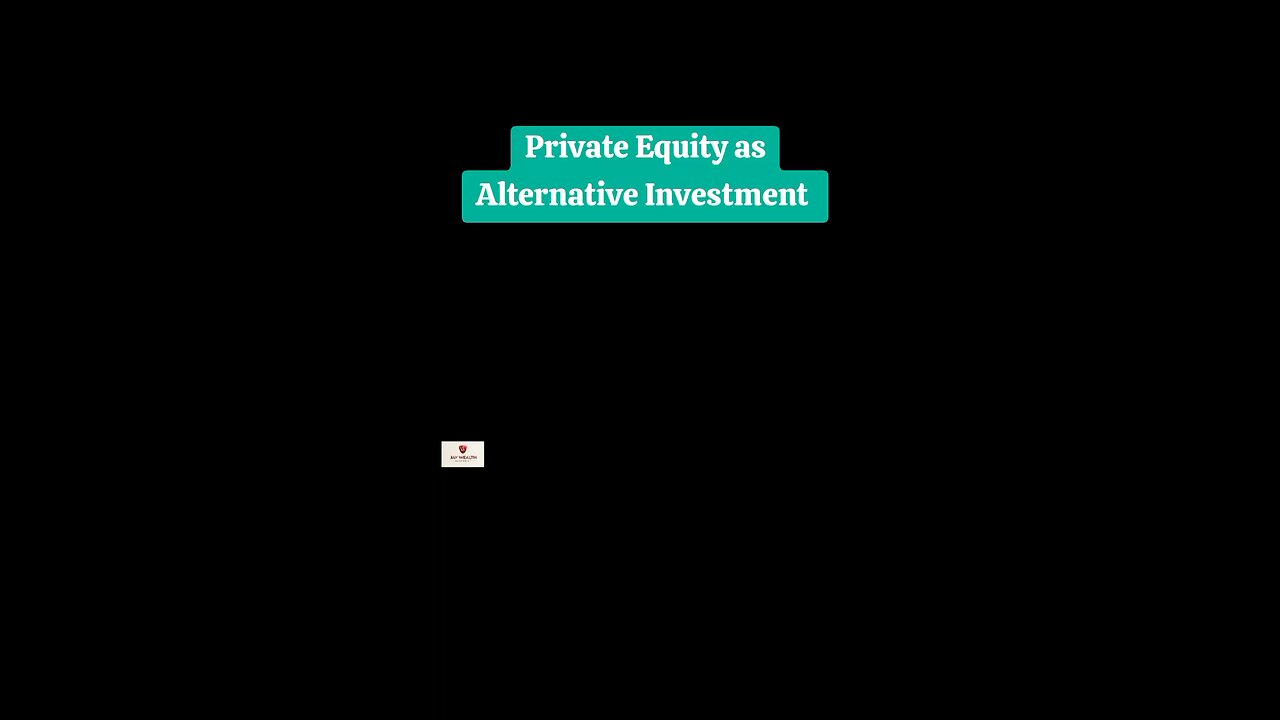Premium Only Content

Private Equity as Alternate Investment
Claim your Moomoo welcome rewards https://j.moomoo.com/01Iik6
Gate.io Crypto exchange, Web3, NFT, Defi
https://www.gate.io/ref/X1NDAVk?ref_type=102
OKX Crypto exchange and Wallet
https://okx.com/join/9458250
Bridget, enjoy the crypto trading joiner together.
https://bit.ly/3Bx99Mn
Enjoy the sharing ideas and earning
https://rumble.com/register/themarkets
Check out https://linktr.ee/thecapmarkets for complete coverage along with all the latest financial news and data!
---
Private equity is a type of investment where firms raise funds from investors to acquire stakes in private companies or to gain control of public companies with the goal of taking them private. Here's a breakdown of key aspects:
1. Investment in Private Companies:
* Not Publicly Traded: Private equity firms invest in companies that are not listed on public stock exchanges. This means their shares are not available for purchase by the general public.
* Active Role: Private equity firms often take an active role in managing and restructuring the companies they invest in to improve their performance and increase their value.
2. How it Works:
* Fundraising: Private equity firms raise capital from institutional investors such as pension funds, endowments, insurance companies, and high-net-worth individuals. These funds are pooled together to make investments.
* Investment Strategies: Private equity firms employ various strategies, including:
* Buyouts: Acquiring a majority stake in a company, often using borrowed money (leverage).
* Growth Capital: Investing in mature companies to fuel expansion and growth.
* Venture Capital: Providing funding to early-stage startups with high growth potential.
* Distressed Investing: Investing in companies facing financial difficulties.
* Value Creation: Private equity firms aim to increase the value of their investments through operational improvements, strategic changes, and financial engineering.
* Exit Strategy: After a period of ownership (typically 3-7 years), private equity firms exit their investments through various means, such as:
* Initial Public Offering (IPO): Taking the company public by listing its shares on a stock exchange.
* Sale to another company: Selling the stake to a strategic buyer or another private equity firm.
3. Key Players:
* Private Equity Firms: These are the investment management companies that raise funds and make investments (e.g., Blackstone, KKR, Carlyle).
* Investors (Limited Partners): These are the institutions and individuals who provide capital to the private equity firms.
* Portfolio Companies: These are the companies in which the private equity firms invest.
4. Advantages of Private Equity:
* Potential for High Returns: Private equity investments have the potential to generate higher returns compared to traditional investments like stocks and bonds.
* Active Management: Private equity firms actively manage their investments, which can lead to improved performance.
* Long-Term Focus: Private equity investments typically have a longer time horizon, allowing for strategic changes and value creation.
5. Disadvantages of Private Equity:
* Illiquidity: Private equity investments are illiquid, meaning they cannot be easily bought or sold.
* High Fees: Private equity firms charge management fees and performance fees, which can be substantial.
* Risk: Private equity investments carry inherent risks, including the risk of loss of capital.
In Summary:
Private equity is an alternative investment strategy that involves investing in private companies with the goal of generating high returns. It plays a significant role in the global economy by providing capital to businesses and driving growth and innovation. However, it's important to understand the risks and complexities associated with private equity before investing.
#ai #ev #bitcoin
-
 LIVE
LIVE
megimu32
2 hours agoON THE SUBJECT: IRL Streamers Attacked & Nostalgic Animal Movies That Made Us Cry
337 watching -
 1:00:54
1:00:54
The Tom Renz Show
6 hours agoMore Epstein/FBI, a Scary Trade War, & the Dem Echo Chamber
829 -
 40:43
40:43
Kimberly Guilfoyle
7 hours agoDems Double Down on Delusion-Why? Live with Tony Kinnett & Bo French | Ep.202
61.7K30 -
 1:28:42
1:28:42
Redacted News
5 hours agoBREAKING! SOMETHING BIG IS HAPPENING IN EUROPE ALL OUT WAR IS COMING AGAINST RUSSIA, TRUMP FURIOUS
108K252 -
 47:50
47:50
Candace Show Podcast
5 hours agoBREAKING: Judge Makes Statement Regarding Taylor Swift's Text Messages. | Candace Ep 155
94.3K102 -
 DVR
DVR
Josh Pate's College Football Show
2 hours agoCFB’s Most Hated Teams | FSU & Clemson Future | Big Ten Win Totals | Star Rankings Overrated?
5.76K -
 1:33:47
1:33:47
CatfishedOnline
4 hours agoGoing Live With Robert - Weekly Recap
19.4K -
 55:18
55:18
LFA TV
1 day agoEurope’s Sudden Turn Against America | TRUMPET DAILY 3.6.25 7PM
25.5K3 -
 4:21
4:21
Tundra Tactical
3 hours ago $1.38 earnedPam Bondi MUST Enforce Due Process NOW!
18.4K1 -
 56:42
56:42
VSiNLive
4 hours agoFollow the Money with Mitch Moss & Pauly Howard | Hour 1
43.6K1